In the fast-paced world of technology, a burning question looms: Will AI replace DevOps Engineers? As automation accelerates, many are left wondering how their roles will evolve. This post will explore the impact of AI on DevOps, diving into both the tasks it can handle and the intricate human skills that remain irreplaceable.
We'll unpack the automation revolution, highlighting which parts of the DevOps workflow AI is already taking over and which areas still require the unique touch of a human engineer. From troubleshooting complex issues to fostering team collaboration, join us as we examine the future landscape of DevOps engineering in an AI-driven world.
Explore this post with:
Table of contents
AI: Friend or Foe for DevOps?
Many DevOps engineers are caught in a whirlpool of emotions concerning AI's rise in their field. According to a GeeksforGeeks article, AI can automate mundane DevOps tasks but has yet to reach the level of replacing engineers. DevOps professionals are crucial for creative problem-solving and strategic planning, roles AI isn't ready to take over.
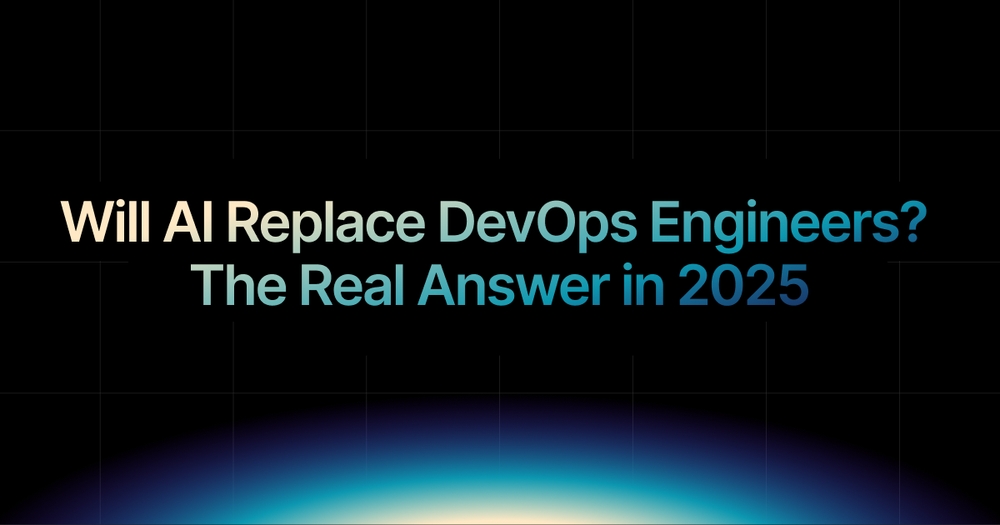
Credits: Kuberns
Some, like Abhishek Veeramalla on LinkedIn, argue that AI presents new roles such as FinOps and MLOps rather than eliminating current positions. Meanwhile, DevOps.com highlights that AI's strength lies in automation, not contextual awareness or collaboration. Engineers who learn to adapt will find exciting new opportunities while those who resist may struggle.
A Medium article suggests that AI is like the dawn of a new era, akin to how the internet reshaped jobs. AI lets engineers focus on complex, human-centric tasks while it handles the repetitive ones. In essence, AI is a toolkit extension, not a replacement, and those who play nice with it could find themselves more in demand than ever.
What Parts of DevOps Engineer Jobs is AI Replacing?
AI is taking over many repetitive coding and scripting tasks that previously occupied DevOps engineers. Tools like GitHub Copilot and AWS CodeGuru can generate code snippets, optimize existing code, and even debug simple issues. This automation extends to writing scripts, configuring CI/CD pipelines, and managing infrastructure as code (IaC), streamlining processes engineers once handled manually.
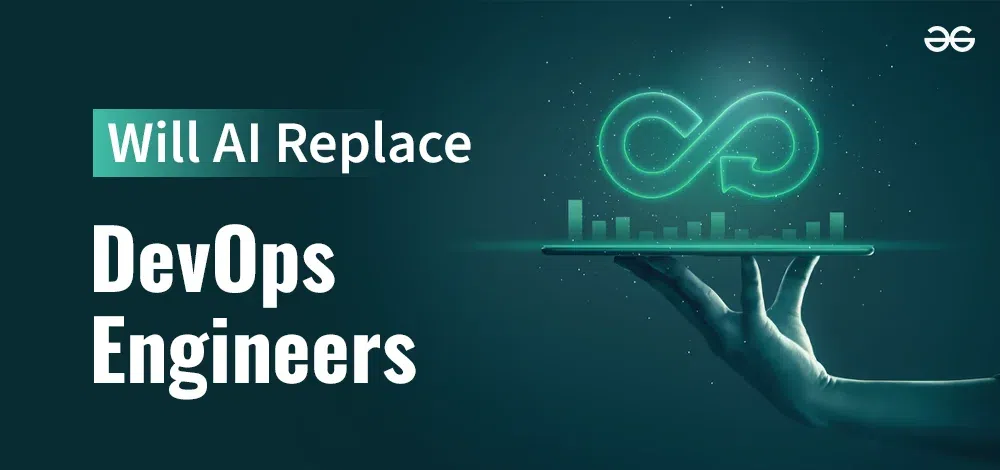
Credits: GeeksforGeeks
Beyond code, AI is transforming how teams monitor systems and respond to incidents. AIOps (Artificial Intelligence for IT Operations) leverages AI to analyze logs and metrics, predict anomalies, and identify potential system failures before they occur. This can include automating basic incident responses for known issues. Furthermore, AI platforms like Azure Autoscale manage resource scaling autonomously based on traffic demands, reducing manual intervention.
AI also enhances code quality assurance and testing. It can analyze code repositories to suggest improvements, automate the generation of test cases, and predict which parts of the code might be prone to bugs. This shift allows engineers to move away from tedious manual reviews, focusing instead on deeper problem-solving and strategic system design, as outlined by Abhishek Veeramalla and GeeksforGeeks.
What AI Won't Replace in DevOps Engineering
AI can automate many tasks, but it doesn't have the smarts for strategic decisions. For instance, determining the best system architecture, ensuring security, or managing cloud costs still requires human judgment to weigh business needs and trade-offs Giri Dharan on Forem. AI can suggest solutions, but an engineer needs to make the final call, especially for unique company setups that demand creative problem-solving Kuberns Cloud on dev.to.
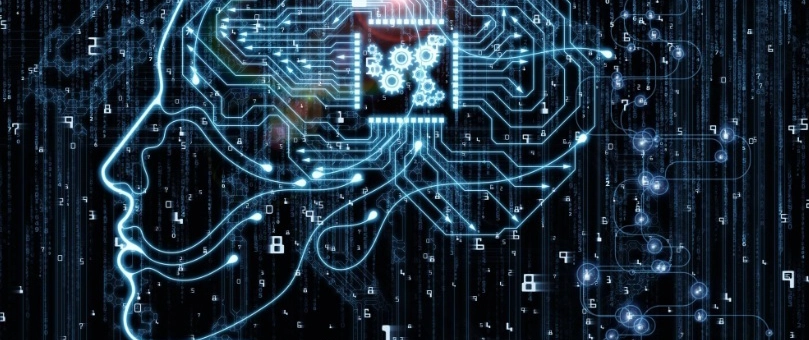
Credits: Giri Dharan
Beyond code, DevOps is deeply about people working together. AI can't mediate conflicts or negotiate priorities between different teams, which is a big part of coordinating developers, security, and operations Giri Dharan on Forem. This human touch also involves explaining complex technical information to non-technical stakeholders, bridging communication gaps AI struggles with Kuberns Cloud on dev.to. The field itself is always growing, with new areas like FinOps, AIOps, and MLOps presenting fresh challenges and opportunities for human innovation Abhishek Veeramalla on LinkedIn.
When things go sideways, AI might flag an error, but finding the actual 'why' often demands deep system knowledge and business context that only an engineer possesses Giri Dharan on Forem. Troubleshooting intricate issues requires more than just pattern recognition; it needs clever, creative problem-solving. This ability to innovate and think outside the box, crafting new functionalities and user experiences, remains a uniquely human skill CMU Bootcamps Blog.
Career pivot for DevOps Engineers
In the AI era, the role of a DevOps Engineer is set to evolve significantly, with a key focus on integrating AI and MLOps into traditional workflows. According to From DevOps to MLOps: A Practical Guide to Shifting Your Career, DevOps professionals must leverage their core skills in automation, CI/CD, and Infrastructure as Code while adapting to manage new AI artifacts like models and datasets. This transformation will also require a shift in monitoring practices to focus on model health and performance metrics.
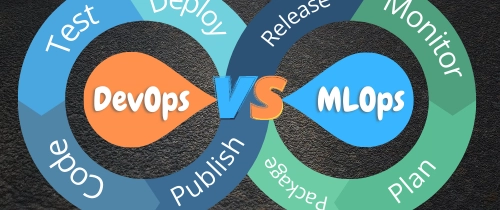
Credits: From DevOps to MLOps: A Practical Guide to Shifting Your Career
To adapt, DevOps Engineers should enhance their understanding of AI and MLOps lifecycles, including model training and deployment. Mastering cloud platforms such as AWS, GCP, and Azure, along with gaining expertise in containerization tools like Docker and Kubernetes, is crucial. As outlined in Transform DevOps with AI, integrating generative AI into CI/CD pipelines can streamline tasks like code reviews and testing, making processes more efficient and adaptable to the AI-driven landscape.
Current job market for DevOps Engineers in the US
The job market for DevOps Engineers in the United States is thriving, with over 32,000 positions currently available according to LinkedIn. Recent data shows that approximately 9,200 new DevOps jobs were posted in just the last 24 hours, highlighting a dynamic landscape where demand continues to surge.
The variety of roles available includes full-time, part-time, and contract positions, with many companies offering remote work options. Top companies hiring include Kforce Inc, OVA.Work, and Bose Corporation, primarily in tech hubs like New York, Austin, and Dallas. As businesses increasingly migrate to cloud technologies, salaries for these roles typically range from $80,000 to over $120,000, making this a lucrative field for both entry-level and experienced professionals.
Is DevOps Engineer AI safe?
The rise of AI in DevOps has sparked questions about job security, but fear not! While AI excels at automating repetitive tasks like code checks and log analysis, it lacks the ability to make strategic decisions or navigate complex team dynamics. As GeeksforGeeks points out, AI won't replace DevOps engineers—rather, it will empower them to focus on creative problem-solving and strategic planning, tasks that require human insight.
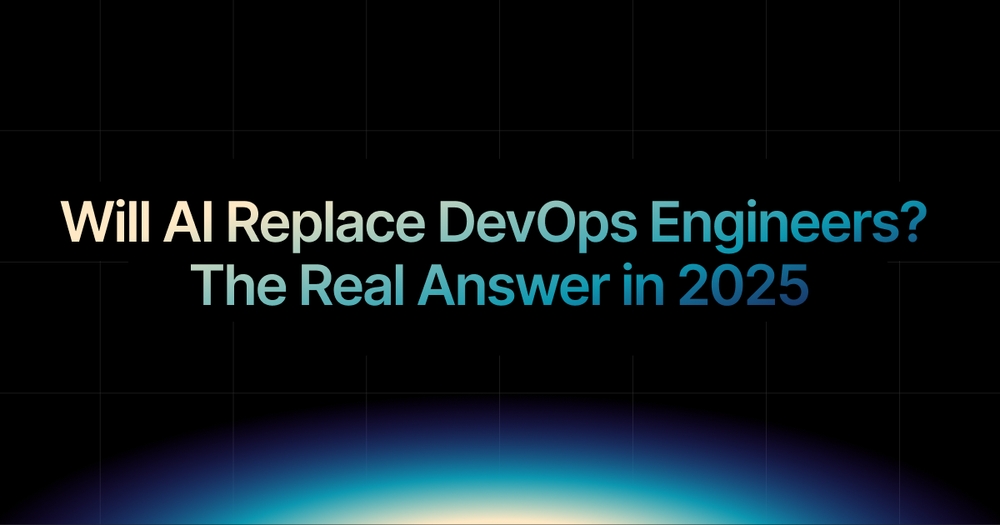
Credits: Kuberns
In fact, emerging roles such as FinOps and MLOps illustrate how AI is creating new opportunities for DevOps professionals. As highlighted by Abhishek Veeramalla, AI is not a threat but a tool that enhances the capabilities of engineers. Those who adapt by incorporating AI tools into their workflow will likely find themselves in higher demand, while those who resist may face challenges in a rapidly evolving landscape.
Hiring a DevOps Engineer? Here's What to Look For
When searching for a DevOps engineer, focus on skills that reflect the current landscape, particularly in AI and automation. Look for proficiency in cloud platforms like AWS and Azure, as well as tools for containerization (think Docker and Kubernetes). Candidates should also demonstrate a solid grasp of CI/CD practices to ensure efficient deployment cycles.
To streamline your candidate screening, consider using Adaface's DevOps Online Test. This test evaluates a candidate's skills in relevant tools and technologies while also assessing their coding abilities. Additionally, the Prompt Engineering Test and the Generative AI Test can help gauge their familiarity with the new wave of AI tools that are transforming DevOps practices.
Prompt Engineering Test
Generative AI Test
DevOps Online Test
AI: A New Dawn for DevOps Engineers
As we venture into the era where AI and DevOps coexist, it's important to recognize the unique opportunities this synergy brings. For current DevOps engineers, AI offers a chance to shed mundane tasks and embrace roles that demand creativity and strategic thinking. According to this insightful article, AI serves as a powerful assistant, allowing engineers to concentrate on complex problems and innovative solutions.
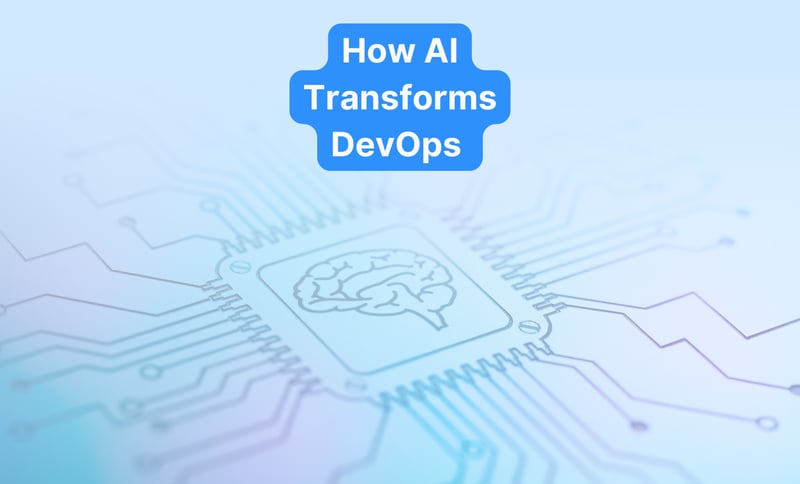
Credits: Axify
For those hiring DevOps professionals, AI introduces a fresh perspective on productivity and innovation. Companies that integrate AI into their DevOps frameworks can enjoy not just streamlined operations, but also the benefits of having engineers who are more invested in strategic outcomes. As highlighted by Abhishek Veeramalla on LinkedIn, AI will augment, not replace, the DevOps role, paving the way for new specializations like FinOps and MLOps.
The future is bright for DevOps engineers ready to evolve with AI. By embracing AI's capabilities, engineers can focus on higher-value tasks, ensuring their roles remain not just relevant, but essential. As the landscape changes, staying adaptable and continuously learning will be key to thriving in this new environment. Let's welcome the exciting possibilities that AI brings to the DevOps world!

40 min skill tests.
No trick questions.
Accurate shortlisting.
We make it easy for you to find the best candidates in your pipeline with a 40 min skills test.
Try for freeRelated posts



